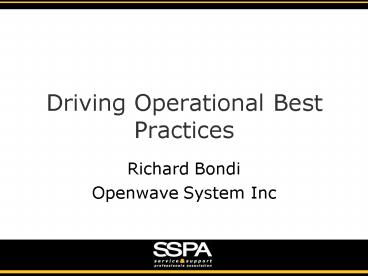Driving Operational Best Practices - PowerPoint PPT Presentation
1 / 25
Title:
Driving Operational Best Practices
Description:
Identify Dependent and Co Pendent. Service Delivery Systems. Identify System Demarcation Points ... Co Pendent Systems. Dependent Systems. User. Staff Skills ... – PowerPoint PPT presentation
Number of Views:56
Avg rating:3.0/5.0
Title: Driving Operational Best Practices
1
Driving Operational Best Practices
- Richard Bondi
- Openwave System Inc
2
Overview
- Overview
3
Openwave Systems Company Summary
- Openwave is the leading independent provider of
open software products and services for the
wireless, wireline, broadband and device
communications industries world-wide - Wireless Industry
- More than 70 mobile customers
- Openwave Mobile Access Gateway accounts for
approximately 44 of global total footprint - Delivered over One Trillion mobile data
transactions to customers and counting - Wireline Broadband Providers
- 1.5 billion messages managed each day worldwide
- 150 million mailboxes for Email, mobile Email,
business messaging, voicemail, video mail, photo
messaging and MMS - Device Manufactures
- 51 handset manufacturers have licensed the
Openwave Mobile Browser - Openwave's client software has shipped in
approximately 900 million handsets to date
4
- How do you drive Operational Excellence across a
Complex Multi-Vendor Service Delivery Platform? - How do you Quantify the Return On Investment?
- Challenges
- Customers Consider Supporting Technology
Components to be part of Overall Product Quality
or Service Delivery - Customers want Operational Best Practices against
End-User Service Availability / Delivery - Equate the Return on Investment to Operational
Proficiency
5
Build Operational Best Practice Workshop
- Overview
6
- Understanding the Service Delivery Architecture
Identify the Complexities of the Service Delivery
Architecture
Identify Dependent and Co Pendent Service
Delivery Systems
- Identify System Demarcation Points
- Availability Validation
- Notifications
- Escalation
Co Pendent Systems
Dependent Systems
7
- Understanding the Service Delivery Architecture
- Complex Systems are comprised of Intersecting
Technology Layers - Operational Best Practices Require that
Technology Layer Components be Managed to the
Task Level - Task Level Ownership and Accountability Builds
Site Maturity and Sustained Service Availability
8
- Understanding the Service Delivery Architecture
Map Technology Components Across The
Infrastructure
High Availability
Storage Systems
Databases
Capture All Tools / Utilities 3rd Party Products
9
- Process Maturity and Service Outage Exposure
Shortcomings In Any Infrastructure
Component Can Effect Service Availability
Service Availability Equation is used to
calculate Outage Exposure D R E Where D
Detection - the length of time before the problem
is detected R Reaction - the sum of the
following sub components N Notification - the
length of time it takes before someone capable of
resolving the issue is notified T Transit -
the length of time that it takes before someone
capable of resolving the issue is in a position
(i.e., connect) to address the issue Re
Rectification, or the length of time needed to
resolve / rectify the situation E Exposure -
the length of time of the outage
10
- Define Your Key Performance Indicators (KPI)
- Define Key Performance Indicators by Technology
Layer - Identify Common or System Wide KPIs
- Group KPIs to Reflect the Service Delivery
Architecture
11
- Create Customer Information Worksheets
Provide Templates to Workshop Customers to
Capture the Current State
12
- Group KPIs to Facilitate Customized Workshops
Build Component Level KPI Sets to Customize
Workshop Material by Customer
13
- Capture Key Customer Data Points
- Capture Key Operational Information Across the
Customer Environment - Referred to as - The Homework Assignment
- The Customer Provides Current State Operational
Information Against Best Practice Performance
Criteria - The Data is Used During the On-Site Workshop and
Validates - What and /or Who is Responsible for Each
Performance Indicator - The On-Site Workshop Facilitates Open In-depth
Discussion - Around the Recommended KPIs and Site Operations
14
- Perform A Gap Analysis
- After Each On-Site Session, Review the KPIs
Discussed in the Workshop and Validate any Gaps. - Assess the Impact to Environment
Identify Recommendations Suggestions Guidance
15
- Summarize KPI Performance by Technology Component
Categorize the Performance Indicators Weight them
in relation to their significance in maintaining
Site Integrity and Service Availability
16
Summarize KPI Performance by Technology Component
- Outline KPI Performance Categories into Summary
Tables - Each summary table outlines performance and
automation information for the particular
component within the environment - Each Table provides rating between 1.0 and 4.0.
- Where 1.0 is a low or a poor rating and 4.0 is
highest rating - Summarize Performance by Overall, Service, and
Capacity
Overall KPI Performance Criteria
17
Summarize KPI Performance by Technology Component
Service and Capacity Criteria
18
- KPI Performance Summary Tables
KPI Performance by Technology Category
19
Building an ROI Model
- Overview
20
- Quantifying the Return on Investment
Compliance to Vendor Supplied Best Practices
Improves Operational Efficiencies and Site
Maturity
These Efficiencies Reduce or Minimize the Number
of Man Hours Required to Maintain Desired Service
Levels
Establish a Model to Equate Man Hours To Service
Activities or Tasks
21
- ROI Ratio Model
Best Practice Rating Identifies Opportunity
for Improvement
- vv
22
Wrap-Up and Summary
- Overview
23
- Wrap-Up - Summary
Measurable Return On Investment
Task Ownership
ROI
Maturity Level
Task Ownership
Site Maturity
Operational Proficiency
Staff Proficiency
24
Questions
- Overview
25
- Questions and Answers































